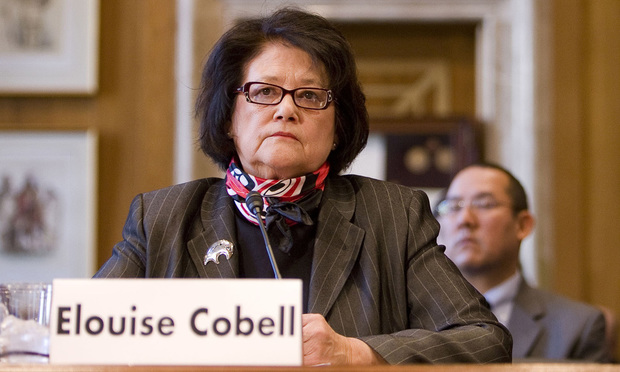DC Circuit Resolves Fee Dispute in Native American Land Trust Suit
The U.S. Court of Appeals for the District of Columbia found that a lower court made the right call when it awarded California-based lawyer Mark Brown $2.88 million in fees plus interest, after he spent nearly six years on a long-running class action.
October 18, 2018 at 04:17 PM
4 minute read
 Elouise Cobell, lead plaintiff in the groundbreaking class-action suit Cobell v. Salazar
Elouise Cobell, lead plaintiff in the groundbreaking class-action suit Cobell v. Salazar
Ruling on a contentious fee dispute, a federal appeals court on Wednesday upheld an award of more than $3.5 million in fees and interest to a California-based lawyer for his work on a historic class action that led to a federal government payout of $3.4 billion to hundreds of thousands of Native Americans.
With its ruling, the U.S. Court of Appeals for the District of Columbia found that a lower court made the right call when it awarded Mark Brown $2.88 million in fees, plus a little less than $736,294 in prejudgment interest. The D.C. Circuit's opinion punctuates a fee dispute that pitted Brown against other plaintiffs lawyers in a long-running legal saga over the federal government's management of Native American land trusts.
The appellate decision also resolves what's likely one of the final pieces of an underlying class action accusing the U.S. Department of the Interior of mismanaging government trust funds for hundreds of thousands of Native Americans. The case is often referred to by the shorthand, Cobell, after lead plaintiff Elouise Cobell, who died in 2011, some 15 years after she sued the U.S. Interior Department in 1996.
The class action eventually resulted in a historic $3.4 billion class action settlement, which was struck in 2009 and later secured final approval despite some opposition, according to court records. In connection with the settlement, lawyers who represented Cobell and other Native American class members, led by a team from Kilpatrick Townsend & Stockton and Washington-based solo practitioner Dennis Gingold, were awarded $99 million in legal fees.
Following that resolution, Brown—who had been on the plaintiffs' legal team from March 2000 to January 2006—intervened in search of compensation for his time on the case. In his appellate brief, Brown said he offered “loyal” service to the Native American plaintiffs but that, around 2005, his relationship with his co-counsel began to sour as a growing number of Kilpatrick Townsend lawyers came on board and Gingold allegedly began cutting Brown out of projects.
Brown initially urged a lower court judge to award him a little more than $5.5 million, representing more than 11,615 hours on the case at an hourly rate of $475 but later upped the request based on a rate of $568 per hour. In response, the other plaintiffs lawyers argued that Brown deserved no fees at all because, they said, he effectively abandoned the case without telling his co-counsel or the plaintiffs and moved back to California after living in Washington for his time on the Cobell litigation.
Ultimately, U.S. Magistrate Judge G. Michael Harvey ruled on the fee dispute, awarding Brown fees based on a $350 hourly rate, which was the amount cited in his engagement letter when he joined the case in 2000. The magistrate judge also awarded interest to Brown.
On appeal, the two sides made arguments similar to those they had presented to Harvey—Brown pushed for an award based on a higher hourly rate, while Kilpatrick Townsend argued that the lower court should have denied his request for fees.
A lawyer representing Brown on appeal, Stephen Larson of Los Angeles-based Larson O'Brien, said he had “nothing but positive things to say” about the D.C. Circuit's conclusion. He noted that, while Brown had sought a slightly higher fee on appeal, the court's affirmance of the fee award and the prejudgment interest means his client got nearly all he was asking for. Larson also praised the appeals court for upholding what, he said, was a well-reasoned lower court ruling.
“We're pleased with the court's decision,” said Larson. “We believe, fundamentally, that Judge Harvey gave a very thorough and thoughtful ruling when he considered this issue in the trial court.”
Adam Charnes of Kilpatrick Townsend, who argued the appeal for the firm, declined to comment.
Read More:
Judge OKs $3.4B deal in Native American suit
This content has been archived. It is available through our partners, LexisNexis® and Bloomberg Law.
To view this content, please continue to their sites.
Not a Lexis Subscriber?
Subscribe Now
Not a Bloomberg Law Subscriber?
Subscribe Now
NOT FOR REPRINT
© 2025 ALM Global, LLC, All Rights Reserved. Request academic re-use from www.copyright.com. All other uses, submit a request to [email protected]. For more information visit Asset & Logo Licensing.
You Might Like
View All
Veteran Litigators Move From Sidley Austin to Alston & Bird's New Chicago Office
3 minute read
'Lack of Independence' or 'Tethered to the Law'? Witnesses Speak on Bondi
4 minute readTrending Stories
- 1Judge Rejects Walgreens' Contractual Dispute Against Founder's Family Member
- 2FTC Sues PepsiCo for Alleged Price Break to Big-Box Retailer, Incurs Holyoak's Wrath
- 3Greenberg Traurig Litigation Co-Chair Returning After Three Years as US Attorney
- 4DC Circuit Rejects Jan. 6 Defendants’ Claim That Pepper Spray Isn't Dangerous Weapon
- 5Quiet Retirement Meets Resounding Win: Quinn Emanuel Name Partner Kathleen Sullivan's Vimeo Victory
Who Got The Work
J. Brugh Lower of Gibbons has entered an appearance for industrial equipment supplier Devco Corporation in a pending trademark infringement lawsuit. The suit, accusing the defendant of selling knock-off Graco products, was filed Dec. 18 in New Jersey District Court by Rivkin Radler on behalf of Graco Inc. and Graco Minnesota. The case, assigned to U.S. District Judge Zahid N. Quraishi, is 3:24-cv-11294, Graco Inc. et al v. Devco Corporation.
Who Got The Work
Rebecca Maller-Stein and Kent A. Yalowitz of Arnold & Porter Kaye Scholer have entered their appearances for Hanaco Venture Capital and its executives, Lior Prosor and David Frankel, in a pending securities lawsuit. The action, filed on Dec. 24 in New York Southern District Court by Zell, Aron & Co. on behalf of Goldeneye Advisors, accuses the defendants of negligently and fraudulently managing the plaintiff's $1 million investment. The case, assigned to U.S. District Judge Vernon S. Broderick, is 1:24-cv-09918, Goldeneye Advisors, LLC v. Hanaco Venture Capital, Ltd. et al.
Who Got The Work
Attorneys from A&O Shearman has stepped in as defense counsel for Toronto-Dominion Bank and other defendants in a pending securities class action. The suit, filed Dec. 11 in New York Southern District Court by Bleichmar Fonti & Auld, accuses the defendants of concealing the bank's 'pervasive' deficiencies in regards to its compliance with the Bank Secrecy Act and the quality of its anti-money laundering controls. The case, assigned to U.S. District Judge Arun Subramanian, is 1:24-cv-09445, Gonzalez v. The Toronto-Dominion Bank et al.
Who Got The Work
Crown Castle International, a Pennsylvania company providing shared communications infrastructure, has turned to Luke D. Wolf of Gordon Rees Scully Mansukhani to fend off a pending breach-of-contract lawsuit. The court action, filed Nov. 25 in Michigan Eastern District Court by Hooper Hathaway PC on behalf of The Town Residences LLC, accuses Crown Castle of failing to transfer approximately $30,000 in utility payments from T-Mobile in breach of a roof-top lease and assignment agreement. The case, assigned to U.S. District Judge Susan K. Declercq, is 2:24-cv-13131, The Town Residences LLC v. T-Mobile US, Inc. et al.
Who Got The Work
Wilfred P. Coronato and Daniel M. Schwartz of McCarter & English have stepped in as defense counsel to Electrolux Home Products Inc. in a pending product liability lawsuit. The court action, filed Nov. 26 in New York Eastern District Court by Poulos Lopiccolo PC and Nagel Rice LLP on behalf of David Stern, alleges that the defendant's refrigerators’ drawers and shelving repeatedly break and fall apart within months after purchase. The case, assigned to U.S. District Judge Joan M. Azrack, is 2:24-cv-08204, Stern v. Electrolux Home Products, Inc.
Featured Firms
Law Offices of Gary Martin Hays & Associates, P.C.
(470) 294-1674
Law Offices of Mark E. Salomone
(857) 444-6468
Smith & Hassler
(713) 739-1250











